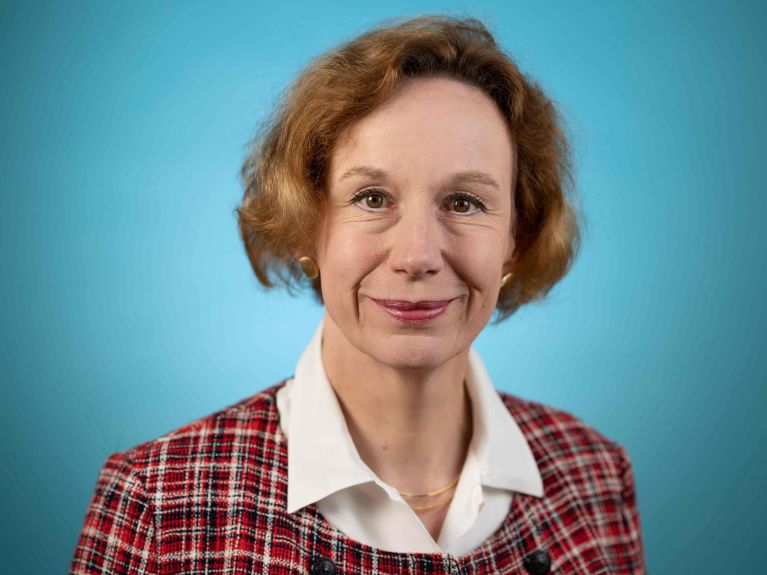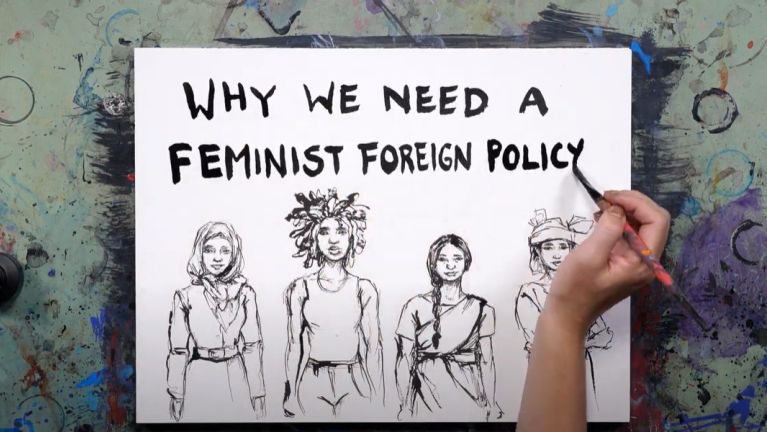“Feminist foreign policy demands that we take the long view”
Gesa Bräutigam, Special Ambassador for Feminist Foreign Policy, tells us why women’s rights are a yardstick for the wider state of society.

The German Foreign Office first published guidelines on feminist foreign policy in March 2023. They are the foundations of German foreign policy efforts to fight structural discrimination against women and marginalised groups around the world. Gesa Bräutigam is the Special Ambassador for Feminist Foreign Policy at the German Foreign Office. She tells us how she is campaigning for this policy to be implemented.
Gesa Bräutigam, what is feminist foreign policy?
Feminist foreign policy is committed to strengthening the rights, representation and resources of women and marginalised groups around the world. So feminist foreign policy isn’t just policy by women for women. It affects everyone and benefits everyone. Depending on the context, men can belong to a marginalised group in society.
In addition to this, we don’t see feminist foreign policy as just another policy area alongside security policy, development policy and so on. It’s a course of action for all areas of foreign policy. As a policy it is enshrined in the coalition agreement for the whole Federal Government. This is why the Development Ministry also worked closely with us to develop a coordinated feminist development policy.
We don’t treat feminist foreign policy as an academic concept. It’s about putting things into practice as pragmatically and effectively as possible. What we do should benefit individual people. But at the same time, feminist foreign policy isn’t a magic wand to conjure away all the world’s problems. It doesn’t bring about change overnight: it demands that we take the long view.
Feminist foreign policy demands that we take the long view.
What is your role as Special Ambassador for Feminist Foreign Policy?
My and my team’s job is to mainstream feminist foreign policy across all areas of German foreign policy and to work with partners to advance it around the world.
What benefits can feminist policy achieve that conventional foreign policy cannot?
Feminist foreign policy tries to eliminate blind spots where we overlook the impacts of our policies. You want to start with a clearer picture, not least in terms of existing foreign policy dilemmas. We always try to include all groups in society in our thinking. If you fight to ensure that all relevant groups are involved in a process, the outcomes are better and more sustainable. Peace agreements negotiated with women and minorities at the table last longer. More inclusive societies are demonstrably more resilient, stable and, very often, economically more successful.
Dieses YouTube-Video kann in einem neuen Tab abgespielt werden
YouTube öffnenThird party content
We use YouTube to embed content that may collect data about your activity. Please review the details and accept the service to see this content.
Open consent formCan you share an example of successful feminist foreign policy?
One example would be the situation of women and girls in Iran. To us, feminist foreign policy means that, in light of the brutal repression of women in Iran, there can be no “business as usual” with the regime there. Quite the opposite, in fact. In the teeth of fierce resistance, we have set up a United Nations fact-finding mission into the human rights situation in Iran which we recently succeeded in extending. The goal of the mission is to document the crimes of the Iranian regime against its own people, particularly in the context of efforts to suppress protests led by women. We’re sending a message condemning the culture of impunity in Iran which encourages arbitrary state violence. We’ve imposed swingeing sanctions against the Iranian leadership and provided visas and places on protective programmes for Iranians at particularly high risk.
How much do you network with other countries in Europe and around the world which are also pursuing feminist foreign policies?
With its feminist foreign policy, Germany is following in the footsteps of other countries around the world which already have feminist foreign policy in place, such as Spain, Canada and Mexico. More and more countries are joining our ranks, such as Chile and Mongolia. We are working closely with them. Some have explicitly adopted a feminist foreign policy, while others are implementing these policies but without labelling them as such. What’s striking is that the countries a very diverse crowd. Every single continent is represented. Latin American countries are particularly active in this area. The group of like-minded states is growing, and it shows that feminist foreign policy isn’t just for the West or the elites. It benefits everyone.
Why is feminist foreign policy such an important issue right now?
If you think about it, feminist foreign policy should be the most obvious policy in the world, as 189 countries have committed themselves to women’s equality in law and in practice by signing the United Nations Convention on the Elimination of All Forms of Discrimination against Women and the Universal Declaration of Human Rights. So we’re not imposing “our” values on anyone. Nevertheless, we are currently observing pushback around the world against the rights of women, the LGBTQIA* community and other groups. That is deeply concerning. And that’s why there’s a growing need for active feminist foreign policy. This pushback affects us all, as women’s rights are a yardstick for the wider state of society. If you take away scope for free expression and diversity in a society, it’s almost always the rights of women and minorities which are restricted first. These restrictions are effectively sounding the alarm about the rights of everyone.
We are currently observing pushback around the world against the rights of women, the LGBTQIA* community and other groups. That is deeply concerning.
What changes has feminist foreign policy achieved in German society so far?
At the Foreign Office we have introduced gender budgeting, for example. On the one hand it allows us to measure how much money we are spending in gender-sensitive and transformative ways. On the other hand it forms the basis for the ambitious targets we have set ourselves. By 2025, 85% of Foreign Office project funding is to be used in gender-sensitive ways, and 8% in gender-transformative ways. The Development Ministry has set itself the same objectives. It may sound technical now, but in the end it means that we can actually underpin our feminist foreign policy with a lot of money, and thereby improve the situation of women and marginalised groups around the world in targeted ways.



